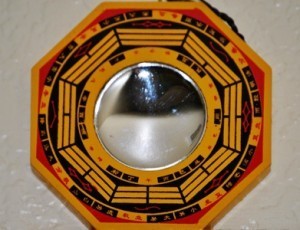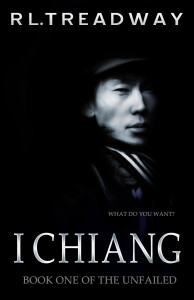Today R L Treadway joins me to share a wonderful post about striking a balance between harmless artistic license and risky cultural misappropriation, drawing on her experiences when researching and writing her upcoming novel, I Chiang.
Artistic License vs. Cultural Misappropriation in Genre Fiction
by R L Treadway
Writers who tell a story from the perspective of a character outside their gender can rely largely on life’s experiences to create a believable portrait. When stuck, a man can ask his sister, mother, or wife for help with specifics. A woman can ask her husband, friend, or brother. Giving credibility to a character not of your sex is fairly easy to work around. But what if you’re a black man writing from the perspective of a white woman?
Or a mixed ethnic woman writing from the perspective of a centuries old Chinese man?
I found myself in this situation with my current work, I Chiang. When I began writing, I didn’t know the main character was Chinese. If you’re a writer, you know we’re often surprised by our characters. :-) As my story progressed, the tale led to Chiang’s date of birth in the late 17th century, and I discovered his assorted likes and dislikes.
In short, I treated Chiang like a man who, as it turned out, happened to be Chinese. A lifelong interest in Chinese history, mythology, and legends/lore gave me a basic knowledge of the culture and I used artistic license to ascertain other aspects of his life.
At first, Chiang’s having come from his era was peripheral, as my storyline is set in the 21st century. When Chiang reaches California in the mid 1800s, however, and stays in America for the duration of the book – my problems begin. He suffers from PTSD-200 years worth – and this is when extensive research on historical data starts. I’m fortunate that my city has archives on the immigrant population of China from this era. Research provided insight into the significance of the Chinese community in building California – particularly my area, Sacramento, as well San Francisco’s Chinatown, and beyond – it gave me a deeper understanding of Chiang and his PTSD.
Artistic Liberty and Cultural Misappropriation
So where is the fine line between artistic liberty and cultural misappropriation? In fiction, a common error is the misuse of culturally identifiable icons or symbols, particularly when those still in use today in ceremony or religious rituals. Inaccurate usage of iconographic symbols contributes to stereotypes and tropes, furthering false depictions of a People. This reduces the mythological figures attached to these symbols to stereotypes and cliches, demeaning traditional beliefs of a group’s centered/grounded cultural identity.

Take the Ba Gua.
In America I find it in esoteric or new age stores. There’s a store online called ‘Mojo Magic’ – yours for the low price of $15. I paid $5 for a similar Ba Gua at an Asian shopping plaza down the street from me.
The Ba Gua was on sale for $40 at an esoteric store downtown, surrounded by books touting westernized-adopted concepts of Feng Shui and Taoist Philosophy, upon which the Ba Gua is actually based. I bought mine at the same Asian store for $10, no frills. These are clear-cut cases of cultural misappropriation of an icon symbol for marketing and profit.
I use the Ba Gua to bring good energies to an otherwise empty wall and hallway leading to my room, but then I know its use. I didn’t buy it for the pretty tassel and mirror to check my eyes in the morning. Feng Shui aside, I appropriated this cultural icon because, for me, it happens to work. I know where to place it.
In fiction, if one of my characters were to use it to summon demons out of a Chinese hell –that misappropriation would paint a distorted picture, completely opposite of what the Ba Gua is and what it does. If, on the other hand, one of my characters used the Ba Gua as a protective device or in geomancy, that portrayal would be in line with its true use and intent.
I’m not an authority on Chinese history but it’s easy to fact check based on what I do know, enabling me to safely fudge things in my storyline. When I research/fact check historical data, it lends credibility to characters not of my ethnicity or historical epoch.
Research Tips
When I need information on Chinese history, I know where to look and who to ask, but what if you don’t know someone and the strangers you might ask don’t want to talk?
1) Wikipedia is a writer’s dream tool but its information is subject to change. If you use Wikipedia, be sure to double- check sources in the lower link area and, if possible, find books in a physical library and/or archives in your state.
2) You Tube is a great source for video and documentaries by and for people of many cultures.
3) Keep an eye out for cultural fairs or festivals in your local paper.
4) Organizations: Immigrants and sovereign nations in America have websites, and may have communities either in your area or your nearest city. A quick run of (Insert your culture group) in (insert country) on Google will turn up interesting possibilities. If you searched the United States you’d find a variety of cultures: the Sons of Norway, an organization for Norwegian immigrants, as well as various locations for Japantown, Little Italy, Little Saigon … the list is endless.
5) Follow a source on Twitter. Once you’ve gotten to know the person, see if he or she is amenable to answering questions. I met Zee Gorman through a mutual friend, and she graciously assented to answering inquiries regarding the authenticity of my storyline.
The idea that it’s okay to slap something into your story simply because it ‘looks cool’ results in too many writers playing it fast and loose. In addition to the possibility of causing offense or ridicule, this continues to create distorted caricatures and stereotypes.
Ethnic stereotyping due to poor research or simply not caring is still prevalent in the mainstream media, as detailed in TV tropes dot org, but I’ve come across the same in self-published, genre fiction far too many times. Writers choosing to publish independently must wear many hats. Adding the role of researcher to verify and validate facts prior to publication is one more. Unless you luck out and your beta readers have extensive knowledge of the culture you’re showcasing, it falls upon you to don the research cap.
Thoughtful research benefits your story, particularly in genre fiction where so many cliche tropes lie, bringing plausibility, believability, and richness to characterization within the consistency of your milieu.
I should mention – it’s also a lot of fun! You might wind up with better ideas than those you started with, as well as a deeper appreciation of the culture you’re writing about.
About RL Treadway
R.L. Treadway is a multi-genre writer in the realm of Dark Fantasy, Epic Fantasy, Sword & Sorcery – and everywhere in-between. Her influences include Michael Moorcock, Robert Howard, Poe, Lovecraft, and George RR Martin. Raised in the multicultural city of Sacramento, California, she’s presently at work on a dark Urban Fantasy series, The Unfailed, with her hometown as its backdrop. The first book in the series, I Chiang is scheduled for publication in Winter 2012.
About I Chiang
War rages beneath human eyes. Immortals, calling themselves ‘Un,’ lurk on the peripheral edge of No Where–in dreams, nightmares, and urban legends.
Chiang is Un: the hungry ghost arisen from violent death, resurrected through dark sorcery.
Haunted by two hundred years of memories, Chiang poses as a special agent of the FBI, his task to track his enemies who move through the underground slave trade. A trail of runaway teens leads him to a small town in America’s Bible belt on the morning of September 11th, 2001…
Chiang knows he walks into a trap. His secrets, and the powers of a medicine woman, are sought after by his nemesis-Dominic Carducci-the devil from his past. If Dominic catches him, the Navaho magic he wields would empower the rise of America’s Satan.
Chiang must reach through the past of ‘No Where’ to find his future, and save two fledgling Un from Dominic’s hell. One thing holds him back. The question he can’t bring himself to face… did he murder his son?




I appreciate the invite Terri. Thanks again for having me on :-)/R
Thank you again for your wonderful post, Rebecca!